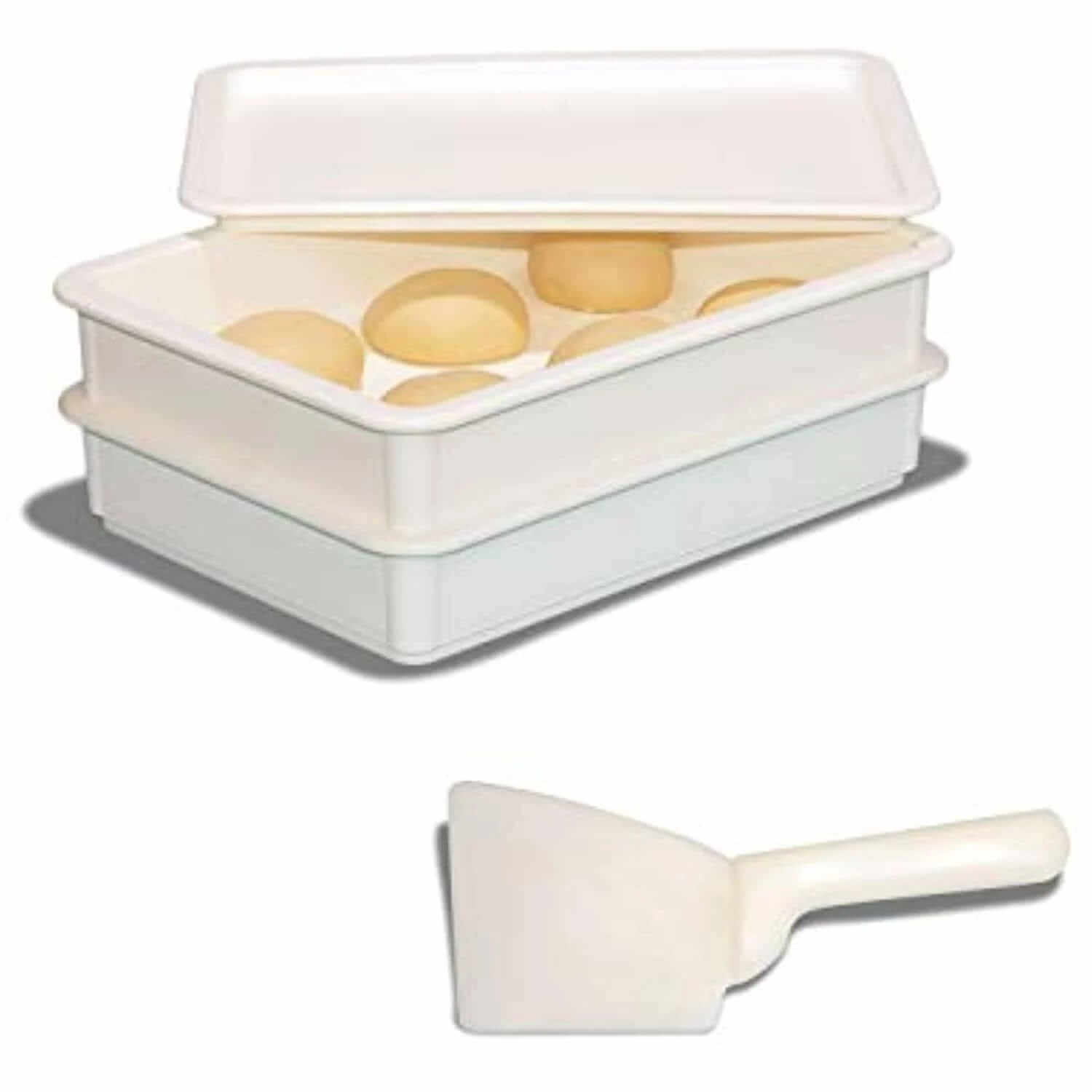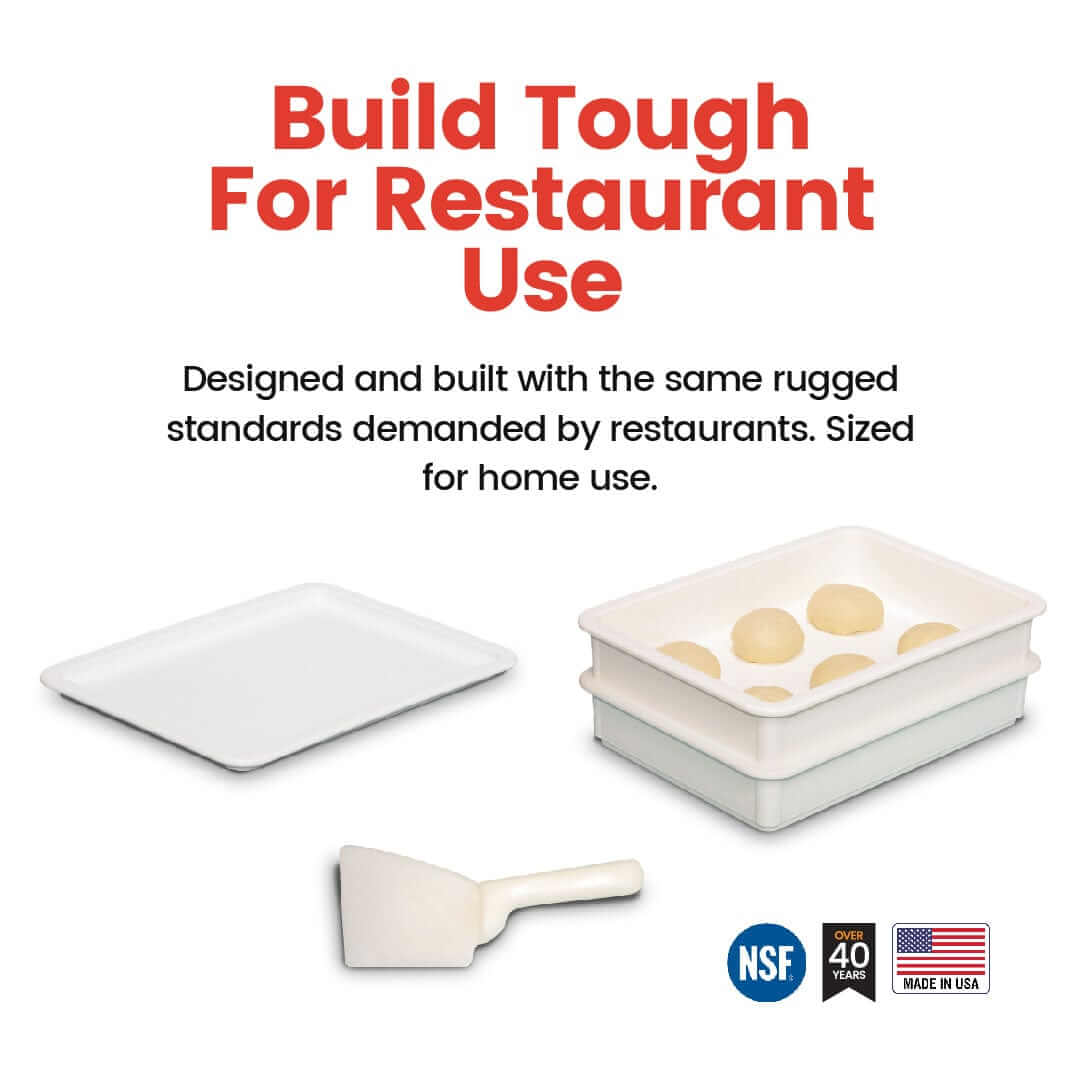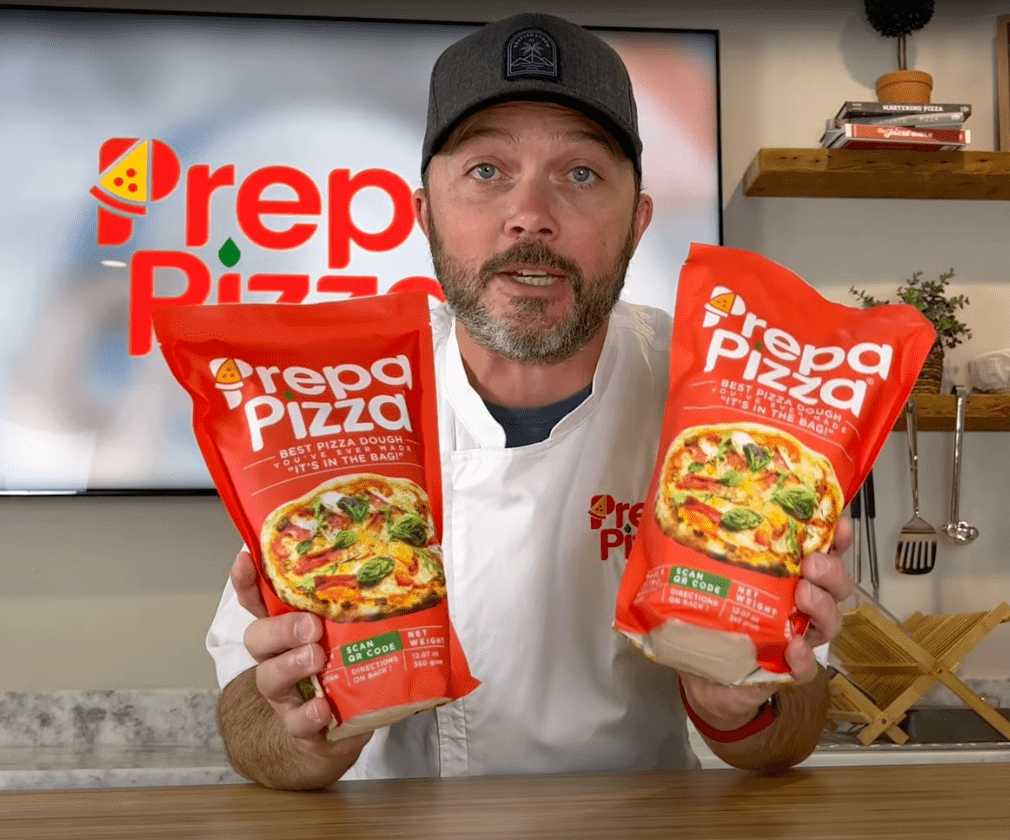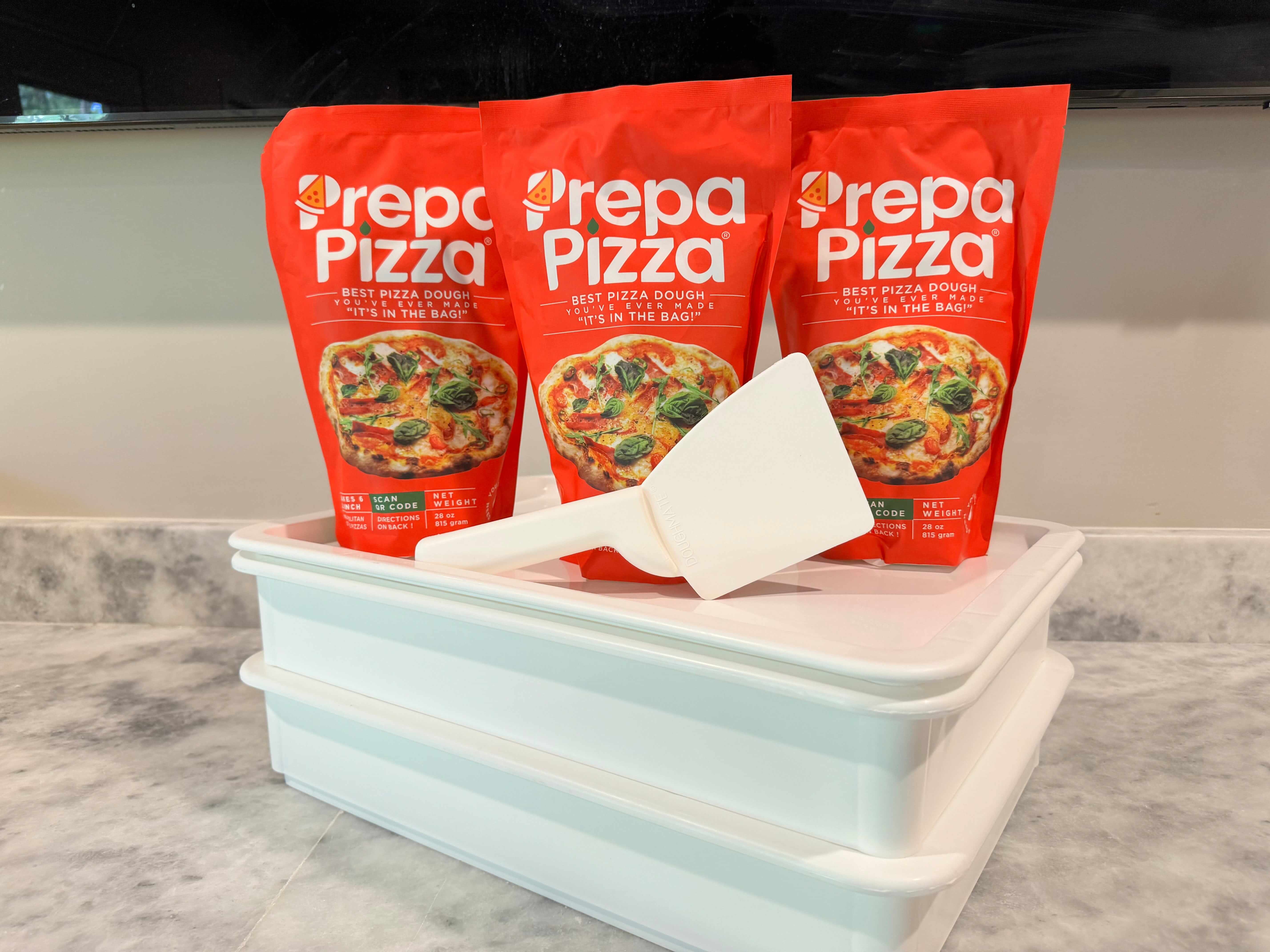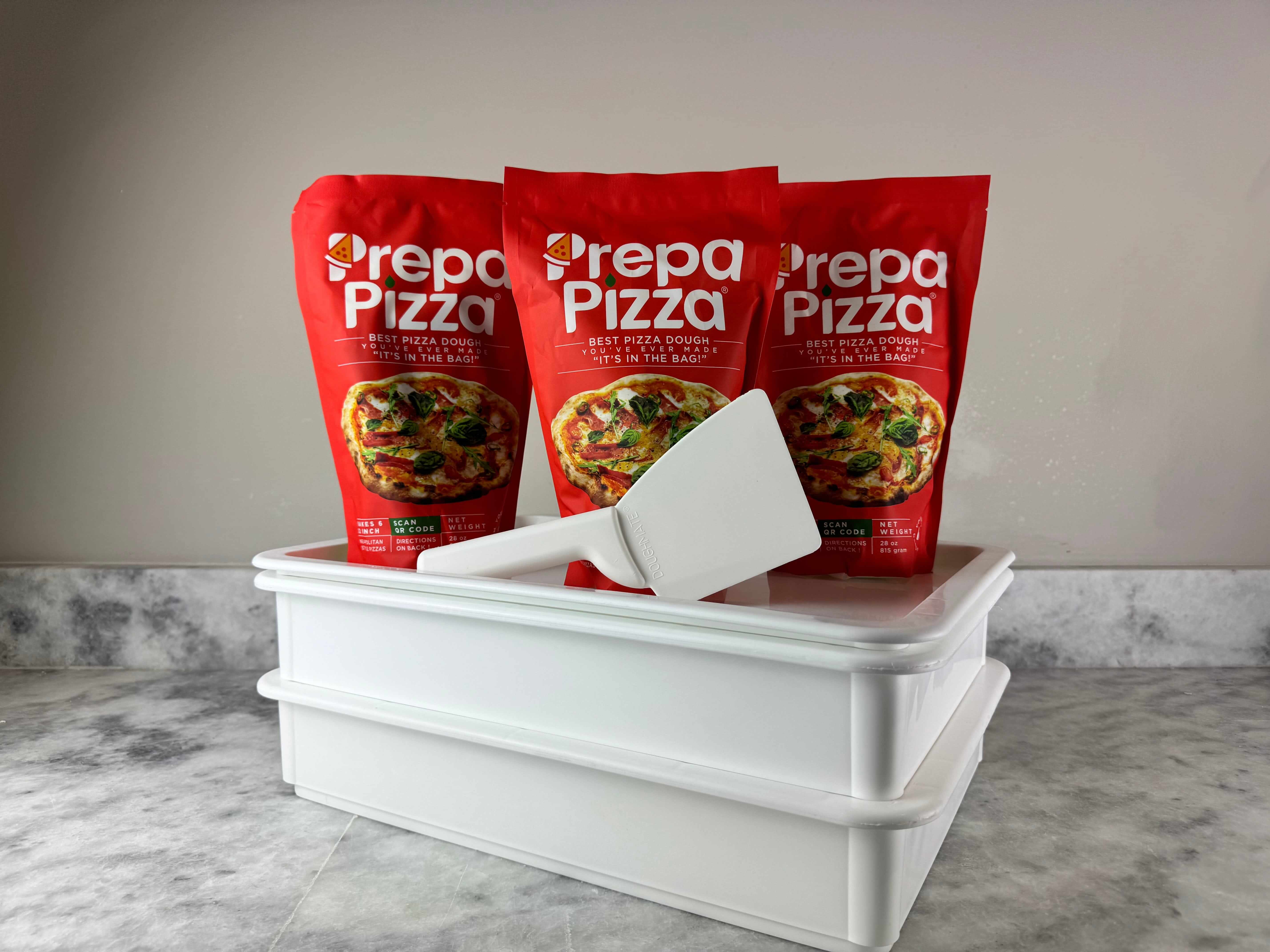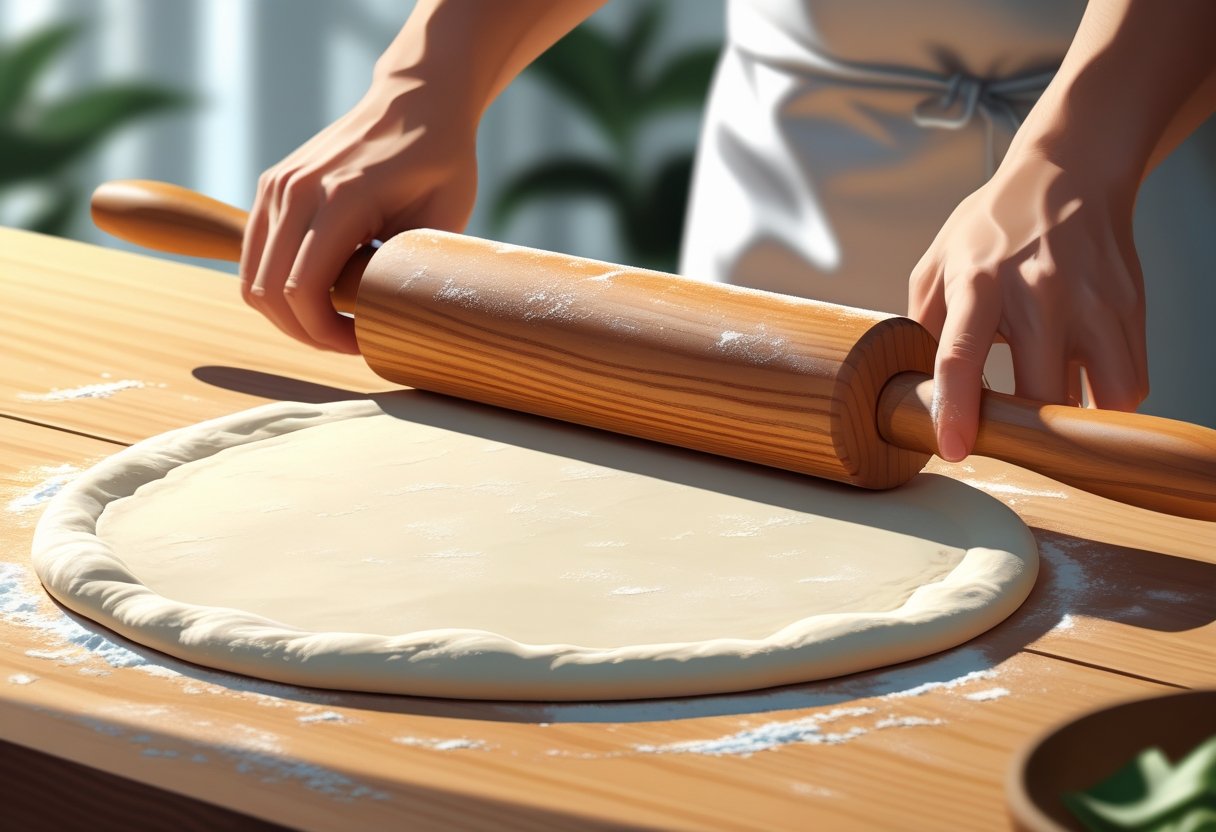
Pizza Dough Roller Guide for Perfectly Even Crusts Every Time
If you want a consistently even pizza crust without the hassle of hand-rolling, a pizza dough roller is an essential tool for your kitchen. A pizza dough roller helps you achieve uniform thickness quickly and easily, saving time and effort while improving the quality of your pizzas. Using a roller ensures your dough is stretched evenly, which means better cooking and a more professional look.
To get the best results with your pizza dough roller, start with high-quality dough like the premade pizza dough from Prepa Pizza. Their dough kits are made with premium ingredients and restaurant-quality standards, making your homemade pizzas taste like they’re from a pizzeria. You can check out the Prepa Pizza dough kit here to elevate your pizza-making experience with dough that's ready to roll and bake.
Pairing a quality premade dough with the right rolling tool simplifies your process and helps you focus on toppings and flavors. Whether you’re a casual cook or cooking for a group, using Prepa Pizza’s dough and a dough roller can turn pizza night into a smooth, enjoyable routine.
What Is a Pizza Dough Roller?
A pizza dough roller is a tool designed to shape and flatten pizza dough to a precise thickness and consistent size. It helps you achieve a uniform crust that cooks evenly, a key factor when using high-quality dough like Prepa Pizza’s premade pizza dough kit, which offers restaurant-grade ingredients and texture for your homemade pizza. Using a pizza dough roller pairs well with this dough to simplify pizza preparation while improving the final result.
When you use Prepa Pizza’s dough, a pizza roller can reduce effort and ensure the dough spreads uniformly every time. This tool can be either manual or mechanized, giving you options that fit your kitchen setup and pizza-making needs.
Key Functions and Advantages
The main function of a pizza dough roller is to flatten your dough evenly without tearing or overworking it. While a rolling pin can do this, a dough roller is specifically designed to create a consistent thickness, critical for even cooking and crispness.
Using a pizza dough roller:
- Guarantees uniform dough thickness
- Saves time and effort compared to hand-rolling
- Enhances dough texture by preventing uneven stretching
- Produces smooth, professional edges
These rollers help manage dough elasticity and minimize bubbles or bubbles’ uneven rise during baking. This is especially important when working with premium premade dough like Prepa Pizza’s, where preserving the dough’s texture ensures you make the most of its quality.
Pizza Dough Roller vs. Rolling Pin
A rolling pin is a simpler, manual tool you likely have, but it offers less control over thickness and shape. Dough rollers are often equipped with adjustable settings to precisely control how thick or thin your dough becomes.
Key differences include:
| Feature | Pizza Dough Roller | Rolling Pin |
|---|---|---|
| Thickness Control | Adjustable and precise | Requires skill and judgment |
| Consistency | Uniform across entire dough | Can be uneven or irregular |
| Speed | Faster for multiple pizzas | Slower, manual effort |
| Ease of Use | Requires minimal technique | Technique-dependent |
For homemade pizza enthusiasts using Prepa Pizza dough, a roller reduces variability and speeds up preparation, making your kitchen work more efficient.
Manual vs. Automatic Pizza Dough Rollers
Manual pizza dough rollers are handheld and simple to use for home cooking. They offer direct control but require more effort and practice to achieve uniform results.
Automatic pizza dough rollers, often found in commercial kitchens, mechanize the flattening process. They provide:
- Consistent thickness and shape with minimal effort
- Faster production, useful when making multiple pizzas
- Adjustable rollers to fit different dough thickness requirements
While automatic rollers may be more expensive and larger, manual rollers are ideal for home use and complement premade dough from Prepa Pizza by helping you quickly form an even crust without needing advanced skills.
Choosing between the two depends on your volume and desired level of convenience. Both work well with premium dough to save time and improve the quality of each pizza base.
For more on pizza dough rollers and how they can fit your kitchen, explore guides like the one at pizzaforguys.com.
Types of Pizza Dough Rollers
Choosing the right tool to roll your pizza dough can make a significant difference in the final crust. Whether you work with Prepa Pizza’s premade dough or dough made from scratch, understanding the types of pizza dough rollers helps you get consistent thickness and texture.
The most common dough rollers come in various materials and designs, each suited for different techniques and results. Some tools are manual and straightforward, while others offer automated precision, ideal for frequent pizza making or larger batches.
Wooden Pizza Dough Rollers
Wooden rolling pins are classic tools favored for their natural feel and control. A wooden pizza dough roller, often made from hardwood, provides a smooth surface that prevents sticking when lightly floured. It’s durable, easy to clean, and lends a traditional touch to your pizza preparation.
These rollers typically come in two styles: a straight rolling pin or one with handles. Straight pins require more wrist control but allow better pressure distribution. Wooden rolling pins excel with Prepa Pizza's dough by evenly spreading it without tearing, essential for maintaining dough integrity.
French Rolling Pin and Other Designs
The French rolling pin is a tapered, handle-less design that lets you feel the dough thickness through direct hand contact. This increased sensitivity gives you precise control over shaping your pizza crust to your preference.
Other designs include weighted rollers or textured rollers, which may help with dough elasticity and shaping. Unlike wooden rolling pins, these variations can be made from different materials but maintain the goal of evenly distributing dough. Using such tools with Prepa Pizza dough supports consistent results whether you aim for thin, crispy crusts or thicker bases.
Dough Sheeter Machines
Dough sheeters are mechanical devices designed to automate rolling, ideal for high-volume or commercial pizza production. They can flatten dough to exact thicknesses, providing consistency that manual rollers sometimes struggle to achieve.
A typical pizza dough sheeter will handle multiple dough sizes and produce uniform crusts quickly. While more common in professional kitchens, smaller electric dough sheeters are now available for home use. Utilizing a dough sheeter with Prepa Pizza premade dough can save time and deliver perfectly even dough ready for your toppings. For those serious about pizza making, investing in a dough sheeter streamlines the process and ensures professional-level crusts every time.
For quality dough suited to any of these rollers or machines, explore Prepa Pizza’s premium premade dough kit.
How to Use a Pizza Dough Roller
Using a pizza dough roller allows you to shape and stretch your dough quickly and evenly. With the right technique, you can control the dough thickness and form a consistent pizza crust every time. For best results, start with a high-quality dough like Prepa Pizza's premade dough, which is made with premium ingredients and designed for easy handling and excellent texture. You can explore Prepa Pizza's dough options here.
When rolling your dough, make sure it’s at room temperature. This ensures elasticity and prevents tearing as you shape your pizza crust.
Shaping Pizza Crust
To shape your pizza crust, first light dust your work surface with flour. Place your dough ball down and flatten it slightly with your hands. Using a pizza dough roller, start at the center and roll outward to shape the dough into a circle.
As you roll, apply even pressure to maintain the round shape. Rotate the dough periodically for uniform shaping. Keep the dough covered or wrapped when not rolling to prevent drying out.
Using premade dough from Prepa Pizza helps you achieve a smooth dough surface, reducing stickiness and making shaping simpler.
Controlling Dough Thickness
Adjusting the dough thickness with your pizza dough roller is vital for the crust texture. Start with a thicker setting on your roller if your dough is cold or less elastic. As the dough softens, lower the roller to achieve the desired thinness.
Thinner dough creates a crispier crust while thicker dough yields a chewier base. For consistent results, roll your dough in stages, gradually reducing thickness.
You may need to lightly flour the dough between multiple rolling passes to prevent sticking. Dividing your dough into smaller portions before rolling can also help manage thickness control.
Tips for Rolling Dough Evenly
To roll dough evenly, flour your roller and surface liberally to reduce sticking. Use steady, smooth motions rather than quick or jerky rolls.
Check dough thickness visually and by feel, ensuring no areas are overly thin or thick. If the dough resists stretching, let it rest for a few minutes before continuing.
Avoid pressing too hard; even pressure across the dough is key. If the dough tears or forms holes, patch them gently and roll again.
Using Prepa Pizza dough provides a forgiving dough that holds elasticity well, making even rolling easier for both beginners and professionals.
Choosing the Best Pizza Dough Roller
Selecting the right pizza dough roller can transform how you prepare your pizza crust at home. Given the quality of dough, like the premium premade dough from Prepa Pizza, using the perfect roller helps you achieve consistent thickness and a smooth finish. This ensures your crust bakes evenly every time.
Your choice impacts how easily you shape the dough, the roller’s durability, and the cleanup process. Understanding specific features related to materials, size, and design will help you pick a tool that fits your pizza-making style.
Essential Features to Consider
When choosing a pizza dough roller, focus on how evenly it flattens your dough. A roller that creates uniform thickness reduces the risk of overcooked or undercooked crust spots. Look for rollers that give you control over the pressure and motion to avoid tearing delicate dough.
If you often work with Prepa Pizza’s restaurant-quality premade dough, you’ll want a roller that handles elasticity without sticking. Dough rollers that include dual rollers can be useful—larger ones for initial flattening and smaller ones for edge smoothing.
Consider whether the roller offers an ergonomic handle. Comfort matters when rolling out dough for several minutes. Some models provide a non-slip grip or padded handles for better control.
Materials and Durability
The best dough rollers are made of materials that resist wear and don’t affect the dough’s taste or texture. Stainless steel and high-grade aluminum are common because they are sturdy and easy to clean. Avoid rollers with coatings that can chip or contaminate your dough.
Wooden rolling pins remain popular among some home bakers for their natural feel and gentle pressure but require more maintenance to prevent warping. If you prefer using a traditional wooden roller occasionally, pairing it with a pastry baking mat set can protect your surfaces and aid in even rolling.
Durability matters when you use your roller frequently with dense dough like the one Prepa Pizza offers. A solid construction will last through repeated use without bending or cracking.
Roller Size and Handle Design
Size affects how quickly and evenly the dough flattens. Larger rollers, around 18 inches wide, cover more surface and speed up the process, especially helpful for bigger pizzas. Smaller rollers give precision on edges and detail work but can slow you down on main flattening tasks.
Handles should be comfortable and designed for smooth rolling. Look for rollers with handles that rotate independently from the roller itself. This reduces wrist strain and improves control over your dough’s thickness.
The ideal roller size and handle depend on your kitchen space and usage frequency. If you mostly bake personal-sized pizzas with Prepa Pizza dough, a medium-sized roller with ergonomic handles is often best.
Cleaning and Maintenance
Ease of cleaning saves time and prevents dough residue buildup. Rollers made from stainless steel or aluminum usually wipe clean quickly. Some components might be dishwasher safe, but hand washing ensures longevity.
Wooden rolling pins require careful drying and occasional oiling to prevent cracking. Using a pastry baking mat can reduce direct flour and dough contact, making cleanup easier.
Regular maintenance includes checking moving parts like handles for smooth rotation. Proper cleaning extends your roller’s life and keeps your pizza crusts consistently smooth and even when using premium premade dough from Prepa Pizza.
For detailed options, you can explore a range of effective dough rollers tailored for home bakers at 10 Best Pizza Dough Rollers to Perfect Your Homemade Crust.
Pizza Dough Rollers for Home and Commercial Use
Using a reliable pizza dough roller or dough sheeter can transform your pizza making by saving time while ensuring consistent thickness and texture. Whether you bake at home or run a busy kitchen, the right tool can make shaping dough easier and more precise. For consistent results, consider using Prepa Pizza’s premade dough, crafted with quality ingredients to deliver a restaurant-quality base every time.
Choosing the best rolling tool depends on your volume, space, and dough handling needs. A pizza dough roller designed for home bakers offers convenience without complexity. Meanwhile, commercial kitchens benefit from powerful sheeters built for high throughput and durability.
Best Pizza Dough Rollers for Home Bakers
As a home baker, you want tools that keep pizza making simple and enjoyable. A compact pizza dough roller helps you achieve even, thin crusts with minimal effort. Look for models with adjustable rolling thickness so you can customize pizza bases to your preference.
Using Prepa Pizza’s premade dough alongside a quality roller reduces preparation time and improves consistency. The dough’s balanced hydration and elasticity work well with rollers, preventing tears or uneven spots.
Features to prioritize include easy cleaning, manageable size, and affordability. A good home roller also doubles for pastries and other dough types, adding versatility. This combination ensures you can make delicious homemade pizza quickly and repeatedly without professional experience.
Recommended Dough Rollers for Professionals
If you prepare pizza regularly in a commercial environment, you need a dough roller that handles frequent use with precision. Professional rollers provide consistent thickness, speeding up the pizza assembly process and reducing variability in crust quality.
Look for rollers with durable construction such as stainless steel components and strong motors for reliable performance under continuous workload. Adjustable thickness settings and safety features like automatic overload protection are important for safe and efficient operation.
Pairing these rollers with Prepa Pizza’s premium dough streamlines workflow since the dough’s texture is optimized for fast shaping. This helps you serve pizzas faster while maintaining the quality your customers expect in a busy kitchen.
Pizza Dough Sheeter for High Volume Kitchens
In high volume kitchens, speed and consistency are critical. A pizza dough sheeter automates rolling, producing perfectly even dough sheets quickly and with minimal labor. These machines can handle large batches, allowing you to scale production without sacrificing quality.
Advanced sheeters offer adjustable roller widths and thickness controls, supporting various pizza sizes and crust styles. Stainless steel construction ensures durability and easy cleaning, essential for commercial food safety standards.
Using Prepa Pizza’s premade dough reduces the need for dough prep on-site and pairs well with dough sheeters to maintain uniform thickness without tearing. This combination improves efficiency while delivering consistently shaped crusts ideal for restaurants, pizzerias, and catering operations.
Additional Baking Tools and Accessories
Using the right tools can significantly improve your pizza-making experience. From mats that provide a nonstick surface to specialty rollers and dockers, these accessories help you handle dough with more precision and ease. When working with high-quality dough like Prepa Pizza’s premade pizza dough, proper tools make a noticeable difference.
Pastry Baking Mat Sets
Pastry baking mat sets provide a smooth, nonstick surface that protects your countertop and helps you roll out dough evenly. These mats are typically made from silicone, offering durability and easy cleaning. They also often feature measurements and guidelines printed directly on the mat, which assist in rolling dough to exact dimensions for consistent crust size.
A good mat minimizes sticking, so you don’t have to add excessive flour that could affect dough texture. Especially when using Prepa Pizza’s premade dough, which has ideal hydration and elasticity, these mats help maintain dough integrity while you’re shaping. Using a mat set also keeps your workspace hygienic and prevents dough from picking up unwanted particles.
Pizza Dough Dockers and Specialty Tools
Pizza dough dockers are essential for managing dough puffiness during baking. By creating small perforations, dockers prevent air bubbles from forming, ensuring a flat, evenly baked crust. This is particularly important if you prefer a crisp, uniform base.
Specialty tools, including pizza dough rollers with ergonomic designs, help you stretch and shape dough without tearing. Dual-roller designs can be handy, allowing you to work on large areas and tight edges efficiently. When paired with Prepa Pizza’s premade dough kit, which is restaurant quality and consistent in texture, these tools ensure a professional finish right in your kitchen.
Investing in both dockers and quality rollers complements the ease and premium quality of pre-made dough, enabling you to focus on crafting the perfect pizza every time. More on the dough kit you can use with these tools is available here.
Frequently Asked Questions
Using a pizza dough roller can help you achieve consistent dough thickness and better shape control, enhancing your final crust quality. Whether you’re working with commercial or home equipment, understanding the differences and features will help you select the best tool for your needs.
Prepa Pizza offers premium quality premade dough to complement your dough rolling process. Their dough kit uses restaurant-grade ingredients to ensure your pizzas start with a solid foundation you can trust. You can explore the Prepa Pizza premade dough here.
What are the key differences between home and commercial pizza dough rollers?
Home pizza dough rollers are typically smaller, manual, or electric models designed for occasional use and limited volume. Commercial models are built for durability, larger capacity, and continuous operation to support busy kitchens.
You’ll find commercial rollers often include adjustable settings for thickness and width, while home versions focus on ease of use and portability.
How does a pizza dough sheeter differ from a roller, and which one should I use?
A pizza dough sheeter passes dough through rollers to create uniform sheets, often used in commercial environments for speed and consistency.
A dough roller can refer to handheld or mechanized tools that flatten dough but may not produce sheets as uniform as sheeters. Choose a sheeter if high volume and precision are priorities. For smaller quantities, a dough roller may suffice.
What should I look for in a high-quality pizza dough roller?
Focus on adjustable roller settings to control dough thickness accurately. Look for sturdy construction, easy cleaning features, and size compatibility with your dough ball dimensions.
Durability and smooth operation are also essential, especially if you plan to use it frequently with dough like that from Prepa Pizza.
Are there any specialized pizza dough rollers designed for thick crust pizza?
Some dough rollers feature settings that allow for thicker, more textured dough. These rollers can handle higher dough volume and create a substantial crust without overworking the dough.
Check for rollers that advertise adjustable gap settings or heavy-duty rollers suitable for thicker dough types.
Can a pizza dough roller improve my pizza crust's texture, and if so, how?
Yes, by evenly flattening the dough, a roller promotes uniform cooking, reducing thin or raw spots. It also helps maintain consistent gluten structure, which can improve chewiness and rise.
Using a roller with high-quality dough like Prepa Pizza’s premade dough kit supports better texture through consistent thickness and shape.
Where can I find reliable reviews for pizza dough rollers available at major retailers?
You can find detailed reviews and expert analysis on websites that specialize in pizza equipment and kitchen tools. Look for reviews that include performance, durability, and value comparisons.
Some online forums and blogs dedicated to pizza-making also provide firsthand user feedback to help choose the right roller for your needs.




